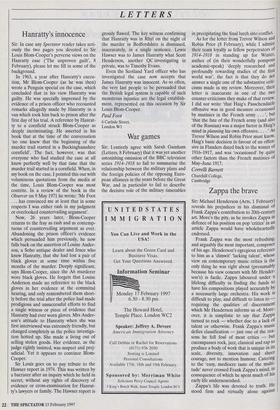War games
Sir: I entirely agree with Sarah Gainham (Letters, 8 February) that it was yet another astonishing omission of the BBC television series 1914-1918 to fail to summarise the relationship between the military plans and the foreign policies of the opposing Euro- pean alliances in the years before the Great War, and in particular to fail to describe the decisive role of the military timetables in precipitating the final lurch into conflict. As for the letter from Trevor Wilson and Robin Prior (8 February), while I admire their team loyalty as fellow perpetrators of 1919-1918 in standing up for Winter, author of (in their wonderfully pompous academic-speak) 'deeply researched and profoundly rewarding studies of the first world war', the fact is that they do not answer a single one of the substantive criti- cisms made in my review. Moreover, their letter is inaccurate in one of the two counter-criticisms they make of that review. I did not write 'that Haig's Passchendaele offensive was in good measure occasioned by mutinies in the French army . . . but `that the fate of the French army (and also of the Russian) was a major factor in Haig's mind in planning his own offensive. . . . M Trevor Wilson and Robin Prior must know, Haig's basic decision in favour of an offen- sive in Flanders dated back to the winter of 1916-1917, and was 'occasioned' by quite other factors than the French mutinies of May—June 1917.
Correlli Barnett
Churchill College,
Cambridge


























































 Previous page
Previous page